Lab’s ‘Andorra’ all about the message
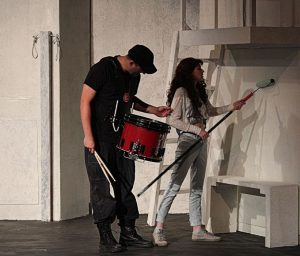 On stage for two more weekends at the Laboratory Theatre of Florida is Andorra by playwright Max Frisch. Set in a fictional European country that resembles Switzerland, this timeless piece of dramatic literature has been chosen by The Lab to observe Holocaust Remembrance Month.
On stage for two more weekends at the Laboratory Theatre of Florida is Andorra by playwright Max Frisch. Set in a fictional European country that resembles Switzerland, this timeless piece of dramatic literature has been chosen by The Lab to observe Holocaust Remembrance Month.
Andorra is by no means an easy, feel-good play. On the positive side, however, it boasts a large and talented case that is fully committed to absorbing, digesting and translating for their 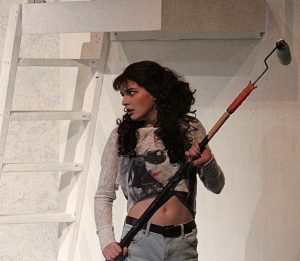 audiences the probing themes and emotionally-charged subjects implicit in Max Frisch’s troubling script.
audiences the probing themes and emotionally-charged subjects implicit in Max Frisch’s troubling script.
Steven Coe is sensational as Andri, a boy who is adopted by a schoolteacher living in Andorra and told he is a Jew. Coe continues his meteoric ascent as a serious character actor, turning in a performance that’s even deeper, stronger and more complex than his previous roles as Jason in 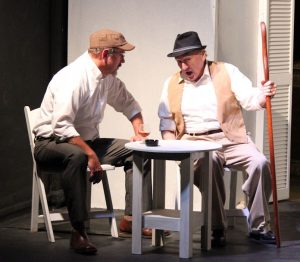 Hand to God, The Boy in Veronica’s Room and Doug in The Way We Get By. Danica Murray is haunting as the Teacher’s daughter and Andri’s love interest and you’ll see at the end of the play just how committed she is to the role, which is a major step forward in her young acting career which, to date, has been dominated mainly by musicals. Rob Green is equally amazing as The Teacher, but it’s TJ Albertson who overpowers both his cast mates and the audience with his seething,
Hand to God, The Boy in Veronica’s Room and Doug in The Way We Get By. Danica Murray is haunting as the Teacher’s daughter and Andri’s love interest and you’ll see at the end of the play just how committed she is to the role, which is a major step forward in her young acting career which, to date, has been dominated mainly by musicals. Rob Green is equally amazing as The Teacher, but it’s TJ Albertson who overpowers both his cast mates and the audience with his seething, 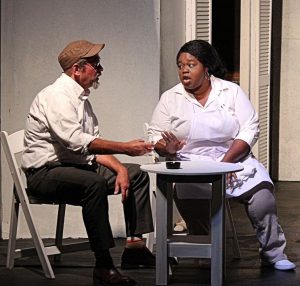 villainous presence and the thunderbolt orders he barks out to his fellow soldiers, poor Andri and the cowed citizens of Andorra.
villainous presence and the thunderbolt orders he barks out to his fellow soldiers, poor Andri and the cowed citizens of Andorra.
But there isn’t a weak performance in this cast, and shout outs are deservedly extended to Heather McLemore Johnson as the Teacher’s wife, Cantrella Canady as the Innkeeper, Isaac Osin as the Doctor, Tracy Meier as the Priest, Bill Allenfort as the Carpenter, Daniel Sabiston as his Journeyman, Kristen Wilson as the Senora, Michael 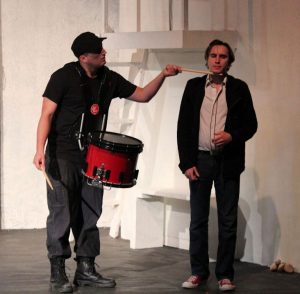 Andrew as the second soldier, Nicholas LeMountain as Somebody, Eren Sisk as an Andorran and the lovely and lovable Kayleigh O’Connell as the Village Idiot.
Andrew as the second soldier, Nicholas LeMountain as Somebody, Eren Sisk as an Andorran and the lovely and lovable Kayleigh O’Connell as the Village Idiot.
The acting alone more than justifies your presence in the proscenium, but Andorra is all about message, and in this regard, the drama operates synergistically on three intertwined planes. At its core, the play is a strident and unequivocal condemnation of blatant anti- Semitism, racism and bigotry in all of their ugly manifestations. Delve deeper, and 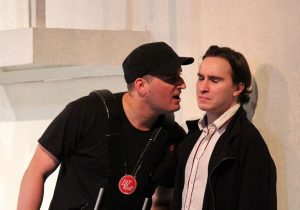 it becomes painfully apparent that Andorra serves as an indictment of casual anti-Semitism, racism and bigotry. But the true horror of Frisch’s socio-psycho analysis is the effect that prejudice and bias have on the individual: people adopt the stereotypical characteristics we ascribe to them and live down to the expectations we, as a society, place on them.
it becomes painfully apparent that Andorra serves as an indictment of casual anti-Semitism, racism and bigotry. But the true horror of Frisch’s socio-psycho analysis is the effect that prejudice and bias have on the individual: people adopt the stereotypical characteristics we ascribe to them and live down to the expectations we, as a society, place on them.
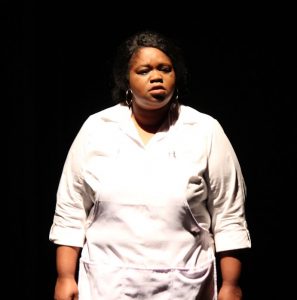 In 2019, it shouldn’t be necessary at all to stage a play that excoriates blatant anti-Semitism, racism, prejudice, bigotry and xenophobia. Sadly, this message is an imperative today as it was when Frisch wrote Andorra in 1961. In fact, anti-Semitism and hate crimes are on the rise around the globe. In a report released just weeks before the attack on the Tree of Life Synagogue, the Anti-Defamation League reported that anti-Semitic incidents jumped 57 percent from 2016 to 2017. That’s the biggest increase since the ADL began keeping statistics
In 2019, it shouldn’t be necessary at all to stage a play that excoriates blatant anti-Semitism, racism, prejudice, bigotry and xenophobia. Sadly, this message is an imperative today as it was when Frisch wrote Andorra in 1961. In fact, anti-Semitism and hate crimes are on the rise around the globe. In a report released just weeks before the attack on the Tree of Life Synagogue, the Anti-Defamation League reported that anti-Semitic incidents jumped 57 percent from 2016 to 2017. That’s the biggest increase since the ADL began keeping statistics 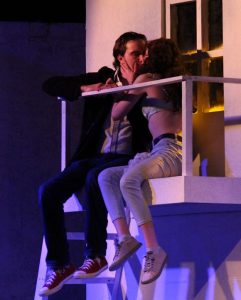 back in 1979.
back in 1979.
While hate crimes (such as vandalism, intimidation, assault and murder) targeting Jews jumped 37% during 2017, hate crimes against all ethnic and religious groups have been increasing over the past decade. According to the Center for the Study of Hate and Extremism at California State University – San Bernardino, 2017 logged the third largest number of such crimes since the FBI began collecting this data, with more than 7,000 incidents reported. But if you correct for massive underreporting in the FBI’s voluntary database, the Bureau of Justice Statistics estimates that the number of hate crimes annually could be 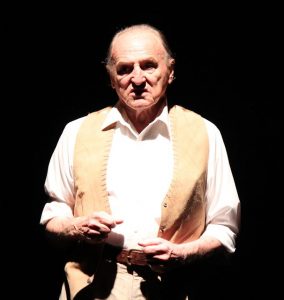 closer to 250,000!
closer to 250,000!
The foregoing statistics presume some sort of overt action, aggression or violence. In Andorra, Frisch employs an unnamed soldier as his stand-in for people inclined to commit this type of overt or blatant bigotry. But Frisch’s soldier, chilling portrayed by evolving “bad boy” actor TJ Albertson (Hand to God (Timmy), And the Winner Is (Tyler Johnes), is not a one-dimensional caricature. Under Artistic Director Annette Trossbach’s direction, there’s the clear implication that Albertson’s Soldier doesn’t hate 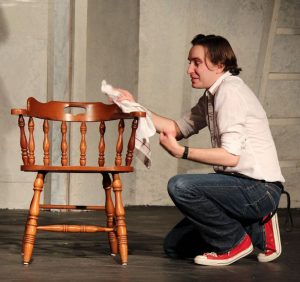 Andri just because he thinks he’s Jewish. The Soldier hates Andri because he doesn’t think and act as the Soldier does. Even worse, Andri questions his authority and challenges the Soldier’s self-perceived superiority over his military subordinates and the Andorran population at large.
Andri just because he thinks he’s Jewish. The Soldier hates Andri because he doesn’t think and act as the Soldier does. Even worse, Andri questions his authority and challenges the Soldier’s self-perceived superiority over his military subordinates and the Andorran population at large.
This aspect of the character provides fundamental insight into the mass psychology of bigotry and prejudice. There’s a need by those who 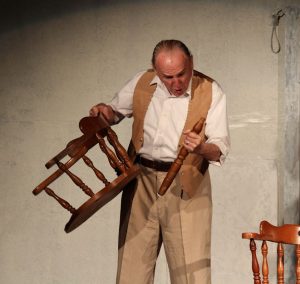 perpetrate hate crimes or engage in hate speech to feel superior to and better than the objects of their opprobrium – be they Jews, blacks, Latinos or Muslims. In extreme cases, they espouse the view that these other races and ethnicities are not only mentally and morally inferior, but genetically as well. Through the character of the Soldier in Andorra, Frisch, Trossbach and Albertson give the audience leave to examine this underlying component of blatant bigotry.
perpetrate hate crimes or engage in hate speech to feel superior to and better than the objects of their opprobrium – be they Jews, blacks, Latinos or Muslims. In extreme cases, they espouse the view that these other races and ethnicities are not only mentally and morally inferior, but genetically as well. Through the character of the Soldier in Andorra, Frisch, Trossbach and Albertson give the audience leave to examine this underlying component of blatant bigotry.
But 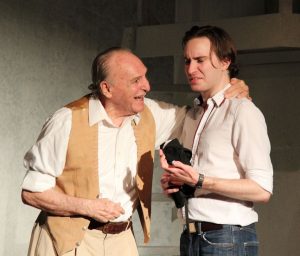 even decent, ordinary folks who would never dream of engaging in the kind of behavior that could be characterized as hate speech or a hate crime can frequently be guilty of casual anti-Semitism or racism. This type of bigotry involves making assumptions about and behaving toward people based on negative stereotypes or prejudices based on race, color or ethnicity, and from the Carpenter and Innkeeper to the Priest and the Doctor, each of the characters who populate the
even decent, ordinary folks who would never dream of engaging in the kind of behavior that could be characterized as hate speech or a hate crime can frequently be guilty of casual anti-Semitism or racism. This type of bigotry involves making assumptions about and behaving toward people based on negative stereotypes or prejudices based on race, color or ethnicity, and from the Carpenter and Innkeeper to the Priest and the Doctor, each of the characters who populate the 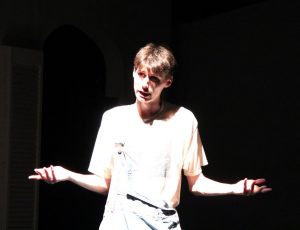 whitewashed town of Andorra exhibit different types and varying degrees of casual anti-Semitism.
whitewashed town of Andorra exhibit different types and varying degrees of casual anti-Semitism.
As Andorra progresses, the audience is confronted with the reality that casual bigotry harms both the purveyors and objects of the prejudice. For instance, the Carpenter (played by Bill Allenfort) cannot accept that Andri has crafted a chair that is far superior to the one assembled by his journeyman because 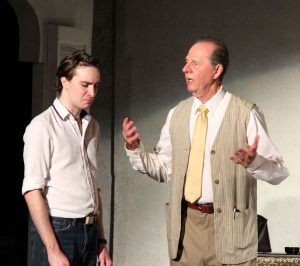 in his mind Jews are better suited to sales and money matters than working with their hands. So when the chair made by the journeyman falls apart, the Carpenter assumes that Andri made it, and there’s nothing the poor boy can say to disabuse the Carpenter of his mistaken belief.
in his mind Jews are better suited to sales and money matters than working with their hands. So when the chair made by the journeyman falls apart, the Carpenter assumes that Andri made it, and there’s nothing the poor boy can say to disabuse the Carpenter of his mistaken belief.
But casual prejudice also exercises a pervasive effect on the victim. It’s only logical given the laws of cosmic science. “What you think, you become,” 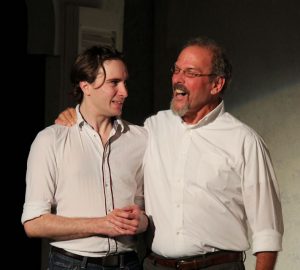 taught Buddha. “You become what you think about all day long,” reiterated Ralph Waldo Emerson. It’s an adage repeated through the years since then by the likes of author Napoleon Hill (Think & Grow Rich), radio personality Earl Nightingale and motivational speaker Jim Rohn. But the mind doesn’t care whether the mental images you plant in it are positive or negative. If you’re told continuously and by enough people that you are or possess certain traits, you’ll come to adopt those attributes, fulfill those stereotypes
taught Buddha. “You become what you think about all day long,” reiterated Ralph Waldo Emerson. It’s an adage repeated through the years since then by the likes of author Napoleon Hill (Think & Grow Rich), radio personality Earl Nightingale and motivational speaker Jim Rohn. But the mind doesn’t care whether the mental images you plant in it are positive or negative. If you’re told continuously and by enough people that you are or possess certain traits, you’ll come to adopt those attributes, fulfill those stereotypes 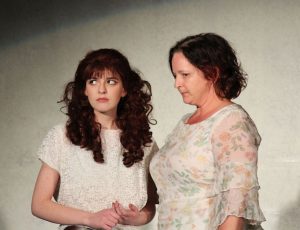 and act accordingly.
and act accordingly.
Casual bigotry is as endemic in our own society as it is in Andorra. It’s rife in Hip Hop and other musical genres from The Clipse and Ghostface Killah to PewDiePie. You hear it when a friend or relative says they’re going to get a Jewish lawyer because they need to sue some bastard. You lock your car doors 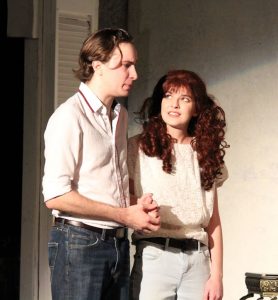 or cross to the other side of the street because an African-American kid with hoodie or a baseball bat is on the sidewalk coming toward you. These examples may seem innocuous enough, but the same principle is at play when a policeman shoots an unarmed black youth because he fears for his life and a jury acquits him even though the use of force is unwarranted or excessive by objective standards.
or cross to the other side of the street because an African-American kid with hoodie or a baseball bat is on the sidewalk coming toward you. These examples may seem innocuous enough, but the same principle is at play when a policeman shoots an unarmed black youth because he fears for his life and a jury acquits him even though the use of force is unwarranted or excessive by objective standards.
The ending in Andorra is shocking, unnerving and designed to elicit gasps and tears. That is simply not enough. What transpires throughout this play should cause each 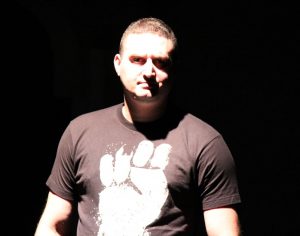 person in the audience to examine their own thoughts and behavior in an effort to identify and eliminate casual anti-Semitism, racism and bigotry from their belief system, attitudes and parlance.
person in the audience to examine their own thoughts and behavior in an effort to identify and eliminate casual anti-Semitism, racism and bigotry from their belief system, attitudes and parlance.
And here’s why.
If the minority groups we target through the stereotypes and prejudices we wrongfully assign to them come 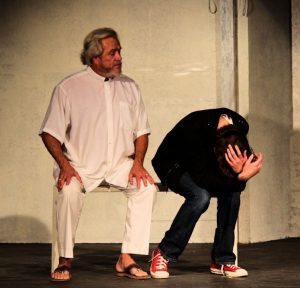 to adopt and exhibit those attributes, traits and behaviors, then we’re not only depriving them of their true potential, we’re planting the seeds of our own destruction as a society and civilization.
to adopt and exhibit those attributes, traits and behaviors, then we’re not only depriving them of their true potential, we’re planting the seeds of our own destruction as a society and civilization.
But there’s more.
Andorra underscores yet another uncomfortable reality. Blatant bigotry and casual anti-Semitism, racism and prejudice require another ingredient to persist and thrive. They depend on complicity or, 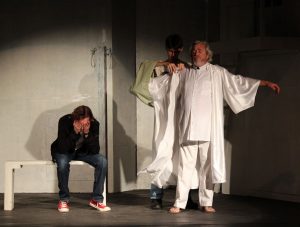 as one Holocaust survivor put it, “most of all upon the indifference of bystanders.”
as one Holocaust survivor put it, “most of all upon the indifference of bystanders.”
Remember that next time you’re inclined to laugh at a joke made at someone else’s expense or a passing remark that belies a casual bias or deep-seated prejudice. Are you going to do as the Andorrans and nod in agreement or smile benignly at the “harmless” joke, or are you going to stand against anti-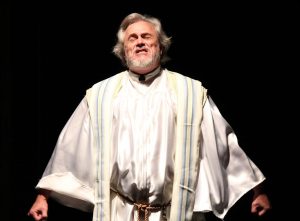 Semitism, racism and other forms and bigotry and call BS on the utterance?
Semitism, racism and other forms and bigotry and call BS on the utterance?
April 4, 2019.
RELATED POSTS.
- Confronting blatant and casual prejudice, ‘Andorra’ still relevant (sad to say)
- ‘Andorra’ play dates, times and ticket info
- Spotlight on ‘Andorra’ actor Steven Coe
- Spotlight on ‘Andorra’ actor Rob Green
- Spotlight on ‘Andorra’ actor Danica Murray
- Spotlight on ‘Andorra’ Innkeeper Cantrella Canady
- Spotlight on ‘Andorra’ Mother Heather McLemore Johnson
- Spotlight on ‘Andorra’ village idiot Kayleigh O’Connell














 Tom Hall is both an amateur artist and aspiring novelist who writes art quest thrillers. He is in the final stages of completing his debut novel titled "Art Detective," a story that fictionalizes the discovery of the fabled billion-dollar Impressionist collection of Parisian art dealer Josse Bernheim-Jeune, thought by many to have perished during World War II when the collection's hiding place, Castle de Rastignac in southern France, was destroyed by the Wehrmacht in reprisal for attacks made by members of the Resistance operating in the area. A former tax attorney, Tom holds a bachelor's degree as well as both a juris doctorate and masters of laws in taxation from the University of Florida. Tom lives in Estero, Florida with his fiancee, Connie, and their four cats.
Tom Hall is both an amateur artist and aspiring novelist who writes art quest thrillers. He is in the final stages of completing his debut novel titled "Art Detective," a story that fictionalizes the discovery of the fabled billion-dollar Impressionist collection of Parisian art dealer Josse Bernheim-Jeune, thought by many to have perished during World War II when the collection's hiding place, Castle de Rastignac in southern France, was destroyed by the Wehrmacht in reprisal for attacks made by members of the Resistance operating in the area. A former tax attorney, Tom holds a bachelor's degree as well as both a juris doctorate and masters of laws in taxation from the University of Florida. Tom lives in Estero, Florida with his fiancee, Connie, and their four cats.